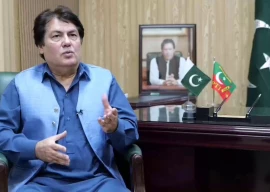
Engineering for social change is no longer an option but an obligation for the global engineering community, according to US professor Bernard Amadei.
Amadei, who believes in engineering with a “human face”, is the founder of Engineers Without Borders (EWB) — an organisation that works to improve the quality of life for underprivileged communities around the world through self-financed, small-scale projects.
“Engineering with a human face is different from traditional engineering because it emphasises the impact on people. In the context of development, it addresses peoples’ basic needs such as water, shelter and energy,” Amadei told The Express Tribune during an interview.
Amadei is on a brief visit to Pakistan to meet government officials and representatives from the academic, engineering and nonprofit communities to promote cooperation in the science and technology field.
He said there were over a billion people lacking access to clean drinking water and another billion with no access to electricity.
He stressed on the need to develop accessible and affordable sustainable technologies to address these issues, adding that such initiatives would also contribute towards peace.
Amadei believed that Pakistani entrepreneurs had a head start over foreign companies wanting to do business in Pakistan.
“Someone living in Pakistan who develops a product knows the market of Pakistan. They know what works and what does not work,” he said.
Amadei emphasised the importance of having young, budding entrepreneurs despite their lack of resources or government support, but admitted that nobody likes change.
“Change is probably the most difficult part of any initiative. There is a funny expression that the only person who likes change is a wet baby,” he said.
Still, he felt that aspiring, young engineers represented the future of Pakistan, calling them for ‘change makers’ and ‘good disrupters.’
“Young people today want to change the world now. Science and technology innovation are unique platforms for them to contribute to the society in a positive way,” Amadei said.
He said service learning — whereby students engage in community service to fulfill course credit requirements during university — could be incorporated in the Pakistani higher education curriculum.
EWB currently has 12,000 members in 325 chapters across the US, with a presence in over 40 countries.
The organisation has helped construct latrines, bridges, dams, renewable energy systems and rainwater catchment systems as part of its initiative to improve the social well-being of disenfranchised communities.
Amadei confirmed that several Pakistani engineering students had approached him regarding the establishment of an EWB-Pakistan partnership following a talk he delivered at a TEDx event in Islamabad on Sunday.
Published in The Express Tribune, March 31st, 2013.
COMMENTS (1)
Comments are moderated and generally will be posted if they are on-topic and not abusive.
For more information, please see our Comments FAQ







1732643921-0/4548774-1403918848-(1)1732643921-0-270x192.webp)









This is a practical , sustainable and mutually beneficial approach . We hope it consolidates and thanks to EWB,